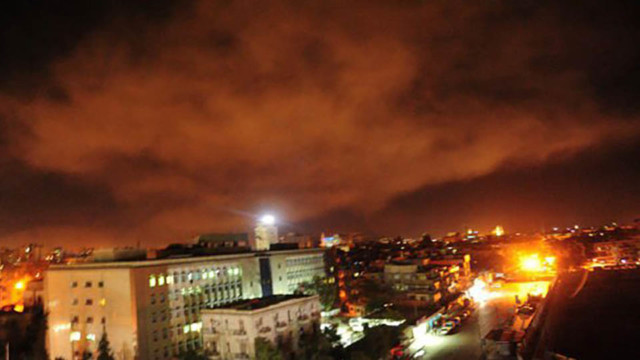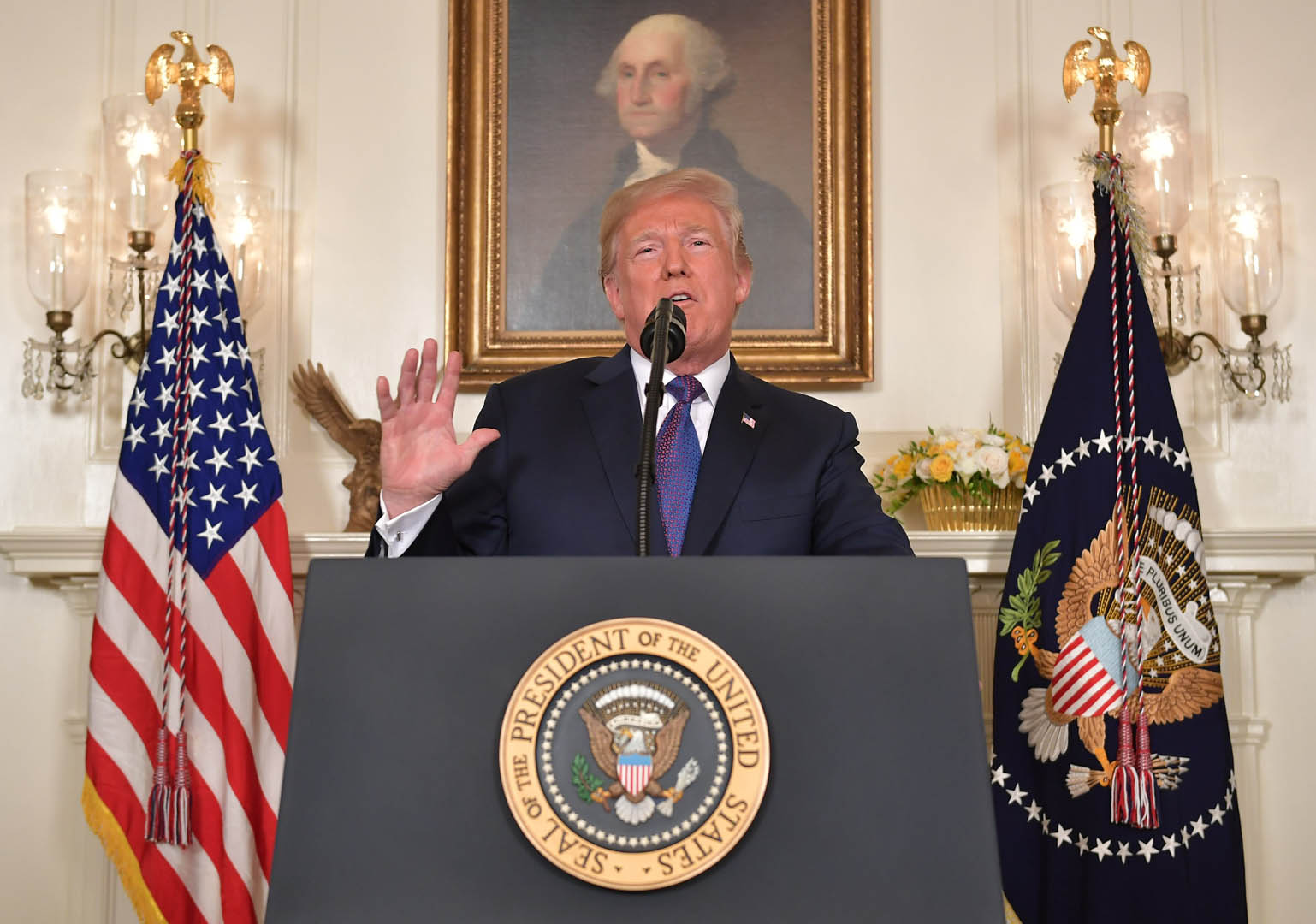In an attack that was over almost as soon as it was announced, the United States, France and Britain launched military strikes into Syria Friday night.
The joint military action was in response to a suspected chemical attack against civilians a week earlier in the rebel held town of Douma, a suburb of Damascus. Pentagon officials said the attacks targeted the heart of Syrian President Assad’s programs to develop and produce chemical weapons.
Syrian television reported the nation’s air defenses responded to the attack, knocking out 13 tomahawk missiles. U.S. Defense Secretary Jim Mattis said there were no reports of U.S. losses in what he described as a “heavy but carefully limited assault.”
In his television address at 9 pm EST, Trump said that the U.S. is prepared to sustain economic, diplomatic and military pressure on Assad until he ends what the president called a “criminal pattern of killing his own people” with internationally banned chemical weapons.
“The evil and the despicable attack left mothers and fathers, infants and children, thrashing in pain and gasping for air. These are not the actions of a man; they are crimes of a monster instead,” Trump said.
By 10:30 pm, Mattis stated the military strike had concluded, no additional strikes were planned, and the assault was a “one-time shot,” so long as Assad does not repeat his use of chemical weapons.
TICK-TOCK of events
10:25 P.M.
Associated Press reports Defense Secretary Mattis says no additional strikes on Syria planned: ‘Right now this is a one-time shot.’
Defense Secretary Mattis Pentagon Briefing:
10:15 P.M.
Reuters reports Syrian state TV claims Syrian air defenses have shot down 13 missiles fired at the U.S.-led attack. It said the missiles had been shot down in the Kiswah area south of Damascus, the capital.
The Syrian Observatory for Human Rights has also said a total of three scientific research centers had been hit in the attacks – two in Damascus and one in the Homs area – in addition to military bases in Damascus.
9:05 P.M.
In an unscheduled address Friday night, U.S. President Trump announced the beginning of military strikes upon Syria. This was in response to alleged chemical attacks by the Syrian military on the rebel held town of Douma.
In his statement, Trump said. “Following the horrors of World War I a century ago, civilized nations joined together to ban chemical warfare. Chemical weapons are uniquely dangerous not only because they inflict gruesome suffering, but because even small amounts can unleash widespread devastation. The purpose of our actions tonight is to establish a strong deterrent against the production, spread, and use of chemical weapons.”
Associated Press reported loud explosions lighting up skies over the Syrian capital, heavy smoke as President Trump announced the airstrikes.
Syrian TV, in the meanwhile, have reported their national air defenses have responded to the coalition strike.
In his remarks, Trump stated, “The combined American, British and French response to the atrocities will integrate all instruments of our national power… We are prepared to sustain this response until Syrian regime stops using chemical agents agents.”
British Prime Minister Theresa May said in London that the West had tried “every possible” diplomatic means to stop Assad from using chemical weapons. “But our efforts have been repeatedly thwarted” by Syria and Russia, she said.
“So there is no practicable alternative to the use of force to degrade and deter the use of chemical weapons by the Syrian regime,” May said. “This is not about intervening in a civil war. It is not about regime change.”
French President Emmanuel Macron also announced the joint military operation with U.S. Britain would be targeting the “clandestine chemical arsenal” in Syria.
Macron also said in a statement Saturday that France’s “red line has been crossed” after a suspected chemical attack last week in the Syrian town of Douma.
The U.S. has about 2,000 troops on the ground in Syria as advisers to a makeshift group of anti-Islamic State fighters known as the Syrian Democratic Forces. They are in eastern Syria, far from Damascus. A U.S.-led coalition has been conducting airstrikes in Syria since September, 2014 as part of a largely successful effort to break the IS grip on both Syria and Iraq.
Edmund Ghareeb discusses President Trump’s decision to strike Syria
CGTN’s Mike Walter spoke with Edmund Ghareeb a former professor at American University, about President Trump’s decision to lead air strike against Syria following the deadly chemical weapons attack in Douma.
Story page includes reporting from The Associated Press.
 CGTN America
CGTN America A photo released on April 14, 2018 the twitter page of the Syrian government’s central military media on April 14, 2018 shows an explosion on the outskirts of Damascus after Western strikes reportedly hit Syrian military bases and chemical research centres in and around the capital. / AFP PHOTO / SYRIAN GOVERNMENT’S CENTRAL MILITARY MEDIA
A photo released on April 14, 2018 the twitter page of the Syrian government’s central military media on April 14, 2018 shows an explosion on the outskirts of Damascus after Western strikes reportedly hit Syrian military bases and chemical research centres in and around the capital. / AFP PHOTO / SYRIAN GOVERNMENT’S CENTRAL MILITARY MEDIA

